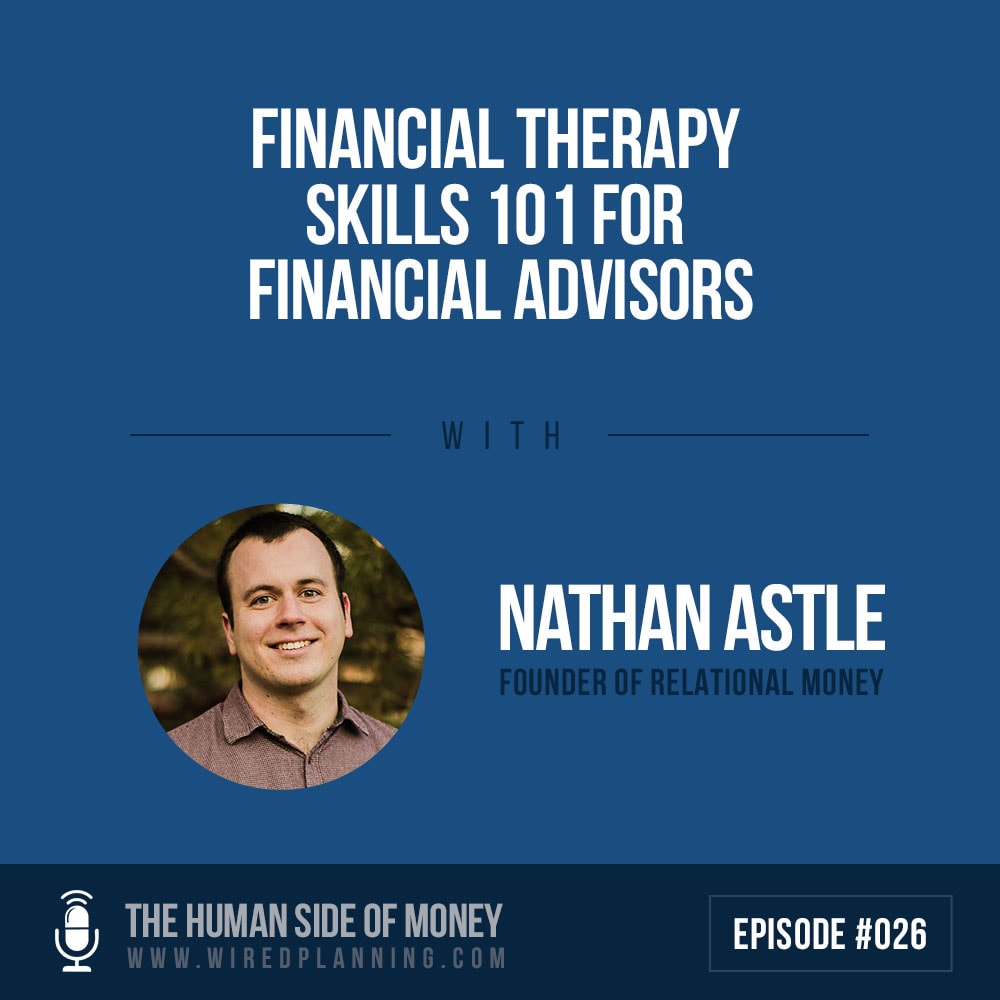Show Links
*If you want to be notified when the next episode packed full of practical tips and strategies to master the human side of money will be released, you can:
- Subscribe to the Show
- Join the community of like-minded advisors and planners across the world being notified via email. In addition to podcast releases, you’ll get our monthly “Wisdom Round Up” where we deliver to you the best content from around the industry on applying behavioral finance and mastering the human side of money.
Episode Summary
As the future value of financial advice continues its shift towards the intersection of technical knowledge and the human side of money, it’s coincided with the rise of certain fields that focus on the person more than the portfolio.
The obvious example of this is the field of behavioral finance, which has been riding a wave of momentum for years now as advisors and industry professionals have accepted the fact that it’s important to understand the biases that exist in the minds of our clients.
The biases that are preventing them from doing exactly what they know they’re supposed to be doing.
And right behind the field of behavioral finance has been the field of financial therapy.
According to the Financial Therapy Association, it’s a process that “helps people think, feel, behave and communicate differently with money to improve overall well-being through evidence-based practices and interventions.”
It’s a focus on truly uncovering the client’s emotions, beliefs and behaviors around money in order to overcome them and change their behavior to align with the life they want to live.
As Nathan Astle says, “People don’t change as easily as spreadsheets do.” And the key to creating change is to better understand the person’s thoughts, feelings and behaviors around money.
A perfectly sound financial strategy paired against a deeply-held belief about money will always be rendered useless.
Even if you don’t want to be a financial therapist, if you’re working with emotionally-charged human beings on an emotionally-charged topic like money, there are skills you can adapt and apply from financial therapy to deliver better outcomes for your clients and your business.
Things You’ll Learn
- The hidden meanings behind sex and money conflict
- Why money issues are rarely about money and how to identify the core issue at play
- How “financial flashpoints” shape your relationship with money and are crucial to changing behavior
- The “Money Timeline” exercise to guide someone through uncovering their financial flashpoints
- Two simple phrases you can use in every meeting to facilitate connection and communication
- The importance of naming and labeling client emotions
- The financial therapy skills that Nathan helps advisors translate into their practice
About Nathan Astle
Nathan is the founder of Relational Money, where he teaches financial advisors the core financial therapy skills they need to deliver the best results for their clients. He’s also a member of the Board of Directors for the Financial Therapy Association and a licensed couples and family therapist with an emphasis in financial therapy.
Other Episodes You’ll Like on Financial Therapy Skills
- Episode 51: The Financial Therapy Skills & Techniques Every Financial Advisor Needs with Dr. Kristy Archuleta
- Episode 7: How To Explore Client’s Emotions, Beliefs, and Behaviors with Catherine Morgan
- Episode 16: Changing Behavior By Focusing On Communication And Connection with Joy Lere
Resources
- Relational Money
- Nathan Astle LinkedIn
- Nathan Astle Twitter
- Financial Therapy Association
- When Clients Fight: How To Handle Conflict When It Erupts In A Client Meeting by Meghaan Lurtz
- Brad Klontz
- Facilitating Financial Health: Tools for Financial Planners, Coaches and Therapists
Whenever you’re ready, there are 3 ways I can help you master the human side of advice:
- HSOA Masterclass: An 8-week group program on building trust & connection, aligning money and life, and delivering frictionless advice.
- The Ultimate Discovery Meeting: A proven framework to seamlessly convert prospects into life-long clients in one meeting.
- HSOA Community (COMING SOON!): An online space to meet, collaborate, discuss, brainstorm, learn and grow with other advisors passionate about the human side of advice
If you’re interested, let me know here.

